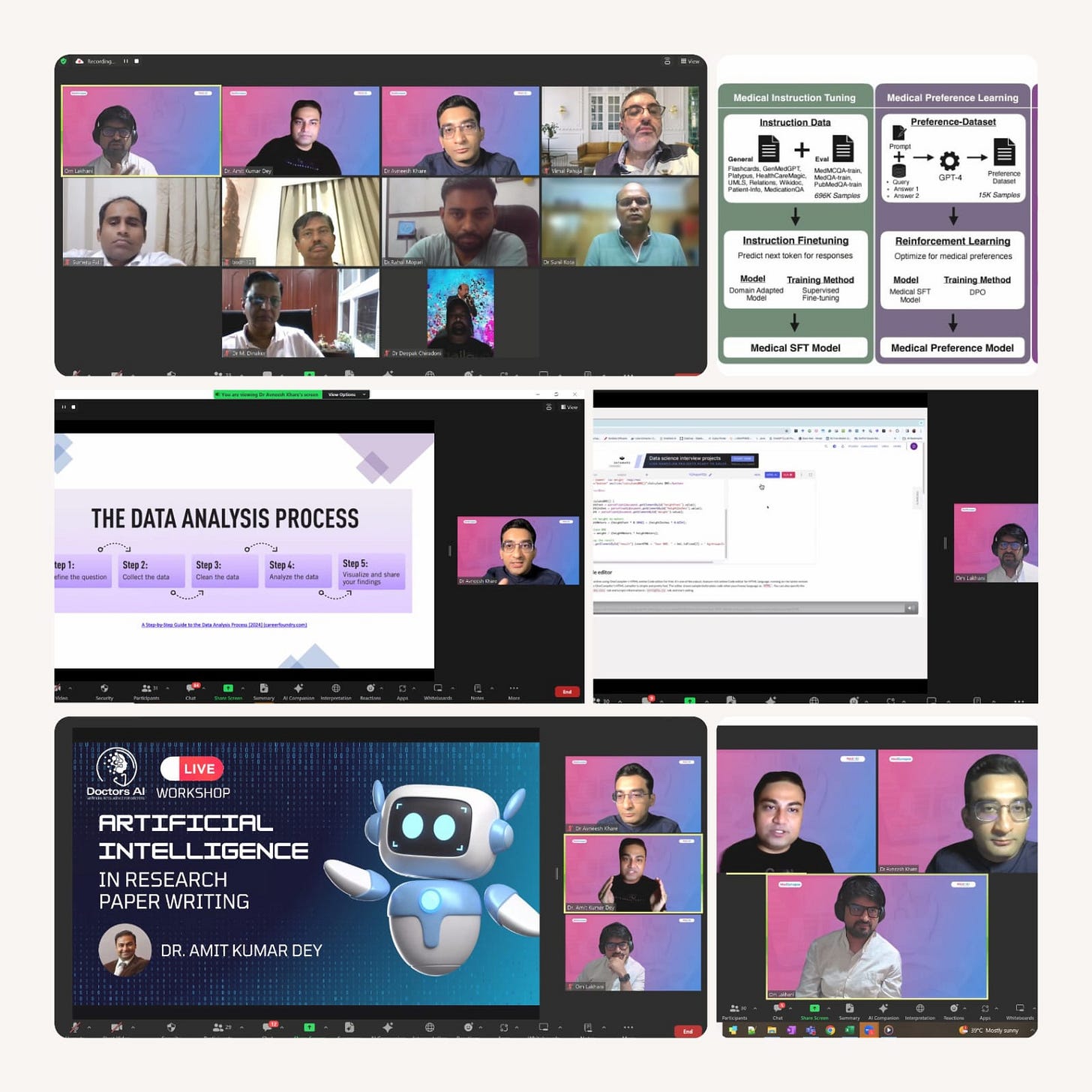📰 From Open-Source AI Validation Tools to Enhanced Cancer Treatment Success Prediction: Discover What’s New in Med AI This Week! 🚀
Updates on Artificial Intelligence & Emerging Technologies in Medicine 🤖💊
“I encourage people to push [AI] for the unknown. I think everyone here knows someone who is suffering from a health condition that needs something beyond what we can offer today.” - Jessica Mega, MD, MPH, Stanford cardiologist and a co-founder of Alphabet’s Verily
Dear Med AI Enthusiast,
Welcome to The ‘Med AI’ Capsule weekly newsletter! Here’s your inside look at how AI and emerging technologies are transforming medicine. ⚕
Whether you're a medical professional 👩⚕️, a tech enthusiast 💻, or simply curious 🧠, The 'Med AI' Capsule is for you!
Stay informed 📰 about the latest updates and insights into the world 🌍 of AI in medicine.
Let the adventure begin! I’m thrilled to have you with me. 🚀
In today’s capsule:
5 News Updates
4 Latest Research Papers
3 Industry Innovators
2 Upcoming Events
1 Knowledge Resource
Reading Time: 7-10 minutes
News Updates 📰
1. 🔍 Epic Introduces Open-Source AI Validation Tool for Medical Use
Epic has launched its first open-source tool to enable healthcare organizations to test and monitor AI models. The AI validation software suite, available for free on GitHub, aims to ensure equity in health AI by being publicly accessible and open to global contributors.
Why Important: This tool allows health systems to validate AI models integrated with electronic health record (EHR) systems, ensuring accurate and safe AI implementation. Automating data collection and mapping, it provides real-time metrics and analysis, significantly reducing the burden on data scientists.
"The tool is targeted primarily at data scientists and clinicians, but we hope that it will be easy enough to understand that a clinician without a data science background can also dig in and learn where the tools are fair and equitable, and where they might need to change the way they are delivering care to improve equity." - Corey Miller, vice president of research and development at Epic
Caution: While promising, the current version does not validate generative AI models, and its success in diverse healthcare settings will depend on addressing potential ethical and operational challenges.
2. 💡 AI Body Composition Analysis Helps Predict Lung Cancer Treatment Success
A study by Mass General Brigham researchers utilized AI-based body composition analysis to predict treatment outcomes for lung cancer. Published in JAMA Oncology, the research highlights the importance of changes in muscle mass and fat quality during treatment.
Why Important: As immunotherapy improves cancer survival rates, there is a need for tools that predict treatment responses and patient outcomes. The study found that changes in body composition, rather than initial body mass index (BMI), are stronger indicators of patient outcomes.
Caution: While promising, the study underscores the need for further research to validate these findings and address potential limitations in AI-based analysis. Ensuring the tool's effectiveness across diverse patient populations and treatment settings is crucial.
3. 🏥 UAE Group Unveils AI Division to Transform Medical Training and Clinical Care
Ajman’s Thumbay Group has launched a dedicated AI division to revolutionize medical education and clinical healthcare. This initiative showcases their commitment to leveraging AI for enhancing training and service delivery.
Why Important: The AI division aims to significantly impact patient care and treatment outcomes by implementing best practices. AI will streamline financial management, patient scheduling, billing, marketing, and resource management, reducing operational costs and minimizing human errors.
Caution: While promising, the success of AI integration depends on addressing potential operational challenges and ensuring effective implementation. Thorough training for healthcare professionals, and continuous evaluation and adaptation are crucial to achieving the desired outcomes.
4. 🚀 AI-Driven Model Enhances Breast Cancer Metastasis Detection
Researchers at UT Southwestern have developed an AI model to enhance MRI sensitivity for detecting breast cancer metastasis, potentially reducing unnecessary biopsies. This noninvasive model uses MRI and machine learning to identify axillary metastasis.
Why Important: Traditional imaging often lacks sensitivity, requiring invasive biopsies to confirm metastasis. The AI model significantly improves detection accuracy, reducing the need for surgical biopsies and associated risks.
“Patients with benign findings from traditional MRI exams or needle biopsies are often subjected to sentinel lymph node biopsy because those tests can miss a significant proportion of metastasis. Our research demonstrates that it’s possible to identify – with a high degree of accuracy – patients who are nonmetastatic, which benefits the patient and also allows the physician to tailor treatment.” - Basak Dogan, M.D., Professor of Radiology
Caution: While promising, further validation with more varied data is necessary to ensure the model's effectiveness across diverse patient populations. Continuous refinement of the image analysis process is important.
5. ❤️ AI Shows Potential to Augment Angiography for Better Cardiovascular Insights
Researchers at the Mayo Clinic have developed AI models that extract data from coronary angiography to predict key cardiovascular biomarkers with over 80% accuracy. This advancement was presented at the Society for Cardiovascular Angiography and Intervention (SCAI) 2024 sessions.
Why Important: The AI-ENCODE study demonstrated that AI can accurately predict left and right ventricular functions, intracardiac pressures, and cardiac index using routine angiograms. This can significantly enhance real-time decision-making in the catheterization lab, improving patient outcomes.
"As humans, we're more intelligent than AI, but we have less capacity. AI will supplement us with the bandwidth so we can achieve bigger things. AI is not a threat. We should use it intelligently to supplement our talent and allow us to focus on the higher-yield things." - Mohamad Alkhouli, MD, division chair of research and innovation at the Mayo Clinic Alix School of Medicine in Rochester, Minnesota
Caution: While promising, the algorithms need refinement and validation before clinical adoption. Additionally, integrating such AI tools into any healthcare system faces challenges such as infrastructure support and capital investment.
Product Showcase ✨
Are you a practising doctor? Do you wish you had an endoscope that fits in your pocket and doesn’t come with bulky wires?
Upgrade your practice with a high-quality wireless endoscope designed by Dr Jagdish Chaturvedi, an ENT surgeon and innovator, built by a doctor for doctors!
Perfect for: Pediatricians, GPs, Family Physicians, Dentists, ENTs, OBGYNs, Med Students
Why you should buy this device:
High-quality imaging for better diagnosis
Easily portable, fits into your pocket
Wireless convenience for easy use
Special price offer for readers of The ‘Med AI’ Capsule Newsletter!
Note: The seller has only a few units left at this special price. This is a one-time offer and will not be available once the stock is gone.
If it interests you, drop me an email on avneeshkhareonline@gmail.com for the special offer on price!
Don’t miss out on this fantastic opportunity to enhance your practice with this state-of-the-art device. Take advantage of this exclusive offer before it's too late!
Latest Research Papers 🔬
Improving Clinician Performance in Classifying EEG Patterns on the Ictal–Interictal Injury Continuum Using Interpretable Machine Learning - demonstrated that an interpretable deep-learning model significantly improves clinicians' accuracy in classifying EEG patterns on the ictal–interictal injury continuum by providing clear case-based explanations, thus enhancing diagnostic processes and supporting the ictal–interictal injury continuum hypothesis.
Clinical Text Datasets for Medical Artificial Intelligence and Large Language Models — A Systematic Review - identifies publicly available clinical text datasets, highlighting accessibility issues and regional disparities, and emphasizes the need for more diversified and accessible data to promote healthcare research.
Evidence-Based Learning Strategies in Medicine Using AI - highlights that Artificial intelligence, particularly large language models like ChatGPT, can significantly enhance medical education by integrating evidence-based learning strategies such as active recall, memory cues, and visual mnemonics, thereby improving the recall and retention of information for medical students.
Diagnosis in Bytes: Comparing the Diagnostic Accuracy of Google and ChatGPT 3.5 as an Educational Support Tool - demonstrated that ChatGPT 3.5 exhibited superior diagnostic accuracy compared to Google in both common and rare urological cases, making it a more effective educational support tool for medical diagnosis.
Industry Innovators 👨🏭
Atropos Health - leverages real-world data to provide rapid, evidence-based insights for healthcare improvement, using tools like Geneva OS to enhance clinical outcomes, research, and operational efficiency.
Aural Analytics - provides clinical-grade speech analytics to enhance patient care with non-invasive, objective, and repeatable metrics, enabling remote and frequent health assessments.
Ada - offers an AI-powered health assessment app that helps users understand and manage their symptoms by providing accurate assessments that can be shared with healthcare professionals.
Upcoming Events 🧑💻
Doctors AI conducted a highly intense 🧠 6-hour marathon hands-on AI training session on a Sunday afternoon/ evening, with 35+ engaging medical professionals joining from all over India and abroad!
AI literacy is key to the rapid adoption of this ever-changing landscape in healthcare, and it was heartwarming to witness such highly interactive participation from everyone who joined.
If you missed out on this one, we’ll be coming up with another workshop! Dates to be announced soon!
Knowledge Resource 📚
Blog Article: A Guide To The Future For Medical Students - The Medical Futurist
This article explores the future of medical training, highlighting the significant changes in medical practice driven by digital health technologies, AI, and patient empowerment.
Future doctors will need to adapt to cultural transformations, develop AI prompt engineering skills, and maintain digital health literacy.
The traditional doctor-patient hierarchy is evolving into a partnership, with doctors guiding patients in using health technologies effectively.
Embracing these changes is essential for delivering compassionate and technologically advanced care.
📢 Important Announcement
Due to some important family commitments, the next edition of my newsletter will be coming out only after a month. I appreciate your understanding and look forward to bringing you more exciting updates on medical AI and emerging tech innovations soon! Thank you for your continued support.
Let’s wrap it up with a poll! 📊
Your feedback is crucial to me, as it helps me understand your interests and improve my offerings. I would appreciate it if you could take a few minutes to share your thoughts about what you've enjoyed and what you think I could do better.
Stay tuned for our upcoming editions as we explore the latest breakthroughs and dive deep into the transformative power of artificial intelligence and emerging technologies, shaping a healthier future. 🚀
Warm regards,







